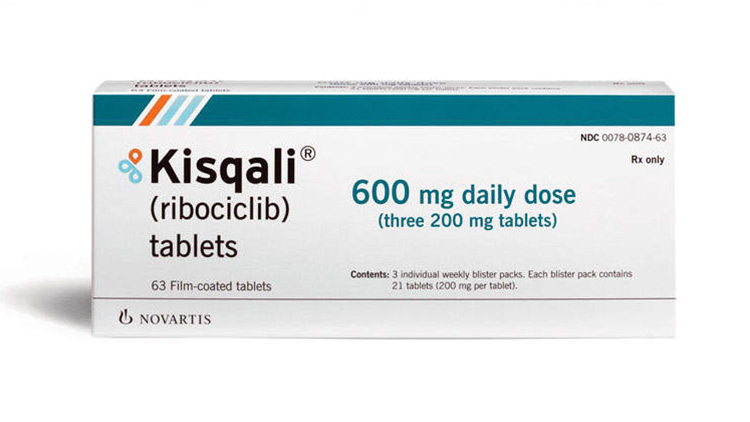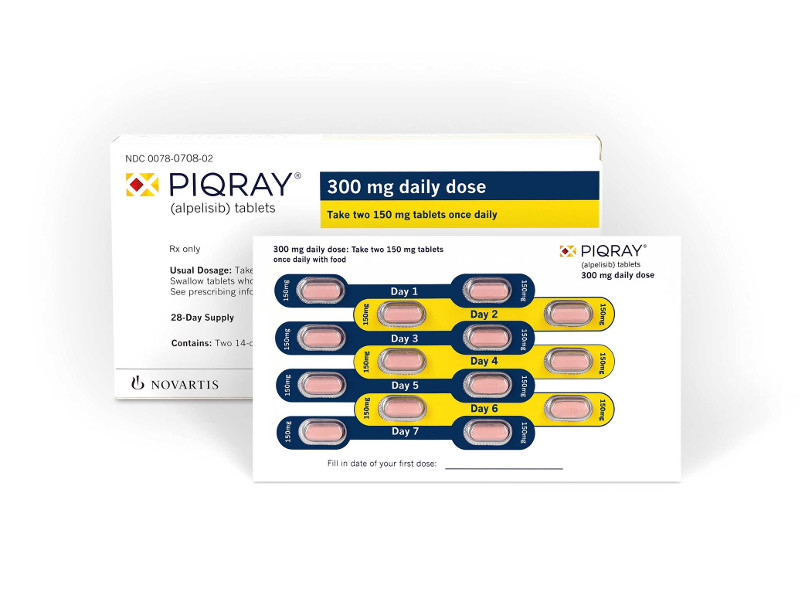Kisqali (ribociclib) vs Piqray (alpelisib)
Kisqali (ribociclib) vs Piqray (alpelisib)
Kisqali (ribociclib) and Piqray (alpelisib) are both targeted therapies used in the treatment of certain types of breast cancer but work through different mechanisms. Kisqali is a CDK4/6 inhibitor that helps to stop cancer cells from dividing and growing, and is typically used in combination with hormone therapy for the treatment of HR-positive, HER2-negative advanced or metastatic breast cancer. Piqray, on the other hand, is a PI3K inhibitor specifically used for patients with a PIK3CA mutation in HR-positive, HER2-negative, advanced or metastatic breast cancer after progression on or after an endocrine-based regimen. The choice between these medications would depend on the patient's specific type of breast cancer, genetic mutations present, prior treatments, and overall health profile, and should be made in consultation with an oncologist.
Difference between Kisqali and Piqray
| Metric | Kisqali (ribociclib) | Piqray (alpelisib) |
|---|---|---|
| Generic name | Ribociclib | Alpelisib |
| Indications | HR-positive, HER2-negative advanced or metastatic breast cancer | HR-positive, HER2-negative, PIK3CA-mutated, advanced or metastatic breast cancer |
| Mechanism of action | CDK4/6 inhibitor | PI3K inhibitor |
| Brand names | Kisqali | Piqray |
| Administrative route | Oral | Oral |
| Side effects | Neutropenia, nausea, infections, fatigue, diarrhea | Hyperglycemia, rash, diarrhea, nausea, fatigue |
| Contraindications | QT prolongation, liver problems, hypersensitivity to ribociclib | Severe hypersensitivity to alpelisib, history of severe skin reactions |
| Drug class | CDK4/6 inhibitor | PI3K inhibitor |
| Manufacturer | Novartis | Novartis |
Efficacy
Efficacy of Kisqali (Ribociclib) in Breast Cancer
Ribociclib, marketed as Kisqali, is an orally administered selective inhibitor of cyclin-dependent kinase 4 and 6 (CDK4/6), which are proteins that play a key role in the progression of the cell cycle and in the proliferation of cancer cells. Kisqali has been shown to be effective in the treatment of hormone receptor-positive (HR+), human epidermal growth factor receptor 2-negative (HER2-) advanced or metastatic breast cancer. In clinical trials, Kisqali, in combination with an aromatase inhibitor or fulvestrant, has significantly improved progression-free survival (PFS) compared to the aromatase inhibitor or fulvestrant alone. The MONALEESA trials, which evaluated the efficacy of Kisqali, demonstrated prolonged survival and delayed disease progression, making it a valuable treatment option for this subset of breast cancer patients.
Efficacy of Piqray (Alpelisib) in Breast Cancer
Alpelisib, sold under the brand name Piqray, is a PI3K inhibitor used specifically for the treatment of PIK3CA-mutated, HR+, HER2- advanced or metastatic breast cancer. This oral medication is used in combination with fulvestrant after the disease has progressed following an endocrine-based regimen. The efficacy of Piqray was primarily shown in the SOLAR-1 clinical trial, where patients with the PIK3CA mutation treated with Piqray plus fulvestrant had a significantly longer PFS compared to those treated with fulvestrant alone. The results indicated that targeting the PIK3CA mutation with Piqray could offer a more tailored and effective approach for patients with this genetic alteration.
Comparative Efficacy in Breast Cancer
While both Kisqali and Piqray are used in the treatment of HR+, HER2- advanced breast cancer, their mechanisms of action and specific indications differ. Kisqali targets CDK4/6, proteins involved in cell division, and is not contingent on the presence of specific mutations. On the other hand, Piqray's efficacy is specifically linked to the presence of PIK3CA mutations, making it a targeted therapy for a subset of patients. Both drugs have been shown to improve PFS when used in combination with endocrine therapy, but the choice between them may depend on the molecular characteristics of the tumor and previous treatments.
Conclusion on the Efficacy of Kisqali and Piqray
In conclusion, Kisqali and Piqray have both demonstrated efficacy in improving clinical outcomes for patients with HR+, HER2- advanced or metastatic breast cancer. Kisqali's broad application in combination with various endocrine therapies offers an effective treatment option for a wide range of patients, while Piqray's targeted approach is particularly beneficial for patients with PIK3CA-mutated breast cancer. The selection of either medication should be based on the patient's specific type of breast cancer, genetic profile, and prior treatment history, with the goal of optimizing therapeutic outcomes.
Regulatory Agency Approvals
Kisqali
-
European Medical Agency (EMA), European Union

-
Food and Drug Administration (FDA), USA

-
Health Canada

-
Therapeutic Goods Administration (TGA), Australia

-
Medsafe (NZ)

Piqray
-
European Medical Agency (EMA), European Union

-
Food and Drug Administration (FDA), USA

Access Kisqali or Piqray today
If Kisqali or Piqray are not approved or available in your country (e.g. due to supply issues), you can access them via Everyone.org.
How it works

Make an enquiry
Choose the medicine you want to buy, answer a couple of questions, and upload your prescription to speed things up. We’ll get back to you within 24 hours.


Make an enquiry
Choose the medicine you want to buy, answer a couple of questions, and upload your prescription to speed things up. We’ll get back to you within 24 hours.


Breeze through the paperwork
We'll guide you through the required documents for importing unapproved medicine, ensuring you have all the necessary information.


Get a personalized quote
We’ll prepare a quote for you, including medicine costs and any shipping, administrative, or import fees that may apply.


Receive your medicine
Accept the quote and we’ll handle the rest - sourcing and safely delivering your medicine.

Some text on this page has been automatically generated. Speak to your physician before you start a new treatment or medication.
Let's talk
If you have any questions, call us or send us a message through WhatsApp or email:
Contact us




